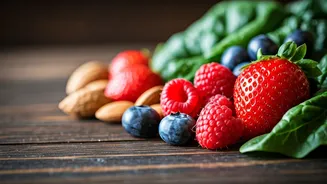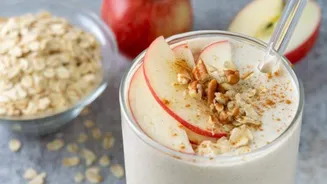Blueberries: Brain's Best Friend
Blueberries are renowned for their high antioxidant content, specifically anthocyanins, which protect the brain from oxidative stress. This stress can
damage brain cells and contribute to age-related cognitive decline. Research suggests that regularly consuming blueberries can enhance memory, improve focus, and slow down the aging process of the brain. You can enjoy blueberries in various ways: as a topping on your morning cereal, blended into a smoothie, or simply eaten as a snack. The antioxidants in blueberries work by neutralizing free radicals, preventing cellular damage and fostering overall brain health. Additionally, blueberries are low in calories and high in fiber, making them a healthy and delicious addition to any diet. Consistent blueberry intake is associated with improved learning and information retention, enhancing the brain's ability to process and recall information effectively.
Fatty Fish: Omega-3 Power
Fatty fish, such as salmon, sardines, and mackerel, are packed with omega-3 fatty acids, crucial for brain health. These essential fats make up a significant portion of the brain's structure and are vital for cognitive function. Omega-3s support communication between brain cells, reducing inflammation and improving blood flow to the brain. Studies indicate that regular consumption of fatty fish can enhance memory, boost mood, and reduce the risk of cognitive decline and other mental health conditions. Incorporating fatty fish into your diet even once or twice a week can make a noticeable difference. You can grill, bake, or pan-fry it. The brain utilizes omega-3s to maintain the integrity of its cell membranes, which is critical for efficient transmission of signals. Omega-3s promote the production of brain-derived neurotrophic factor (BDNF), a protein essential for the growth and survival of brain cells. This protein helps in the creation of new neurons, enhancing cognitive flexibility and learning abilities.
Dark Chocolate: Antioxidant Treat
Dark chocolate, particularly that with a high cocoa content, offers a delightful way to boost brain health. It contains flavonoids, potent antioxidants that improve blood flow to the brain and enhance cognitive function. These flavonoids protect brain cells from damage, promote the growth of new neurons, and improve memory. The caffeine in dark chocolate can also enhance alertness and focus, making it a great pick-me-up. Choosing dark chocolate with at least 70% cocoa content ensures you get the most benefits. Moderate consumption is the key because dark chocolate is also high in calories. Dark chocolate's antioxidants help to reduce inflammation throughout the body, benefiting the brain. The improved blood flow leads to enhanced cognitive performance. The stimulating effects of dark chocolate can improve mood, motivation, and mental clarity, providing an overall sense of well-being while enhancing cognitive abilities.
Nuts and Seeds: Brain Boosters
Nuts and seeds are excellent sources of vitamin E, an antioxidant that protects the brain from cellular damage. They also provide healthy fats, which are essential for brain health and function. Regular consumption of nuts and seeds has been linked to improved memory and cognitive performance. Almonds, walnuts, and flaxseeds are especially beneficial. You can easily incorporate them into your diet by adding them to salads, yogurt, or enjoying them as a snack. Nuts and seeds also provide fiber and protein, which help to keep you feeling full and satisfied, preventing overeating. They are a convenient and nutrient-rich way to enhance your brain health. The healthy fats in nuts and seeds, such as omega-3 fatty acids in walnuts, are crucial for brain cell structure and function. Vitamin E in nuts protects the brain from oxidative stress. This dual action supports brain health.
Whole Grains: Steady Energy
Whole grains provide a steady supply of glucose to the brain, which is the primary source of energy. They also contain fiber, which helps regulate blood sugar levels, preventing the energy crashes that can impair cognitive function. Foods like brown rice, oats, and whole-wheat bread are excellent choices. Consuming whole grains can improve concentration, focus, and memory. They are also packed with essential nutrients like B vitamins, which support brain health. Starting your day with a whole-grain breakfast is a good way to fuel your brain. The sustained release of glucose from whole grains ensures the brain receives a constant supply of energy, supporting consistent cognitive performance throughout the day. Fiber in whole grains helps regulate blood sugar levels, preventing sharp spikes and dips that can affect mental clarity and function. B vitamins play an important role in nerve function.
Avocados: Healthy Fats
Avocados are rich in healthy monounsaturated fats, which support healthy blood flow, including to the brain. Improved blood flow is essential for cognitive function. These fats help keep your brain cells healthy. Avocados also contain antioxidants that protect brain cells from damage. The consumption of avocados has been linked to improved cognitive performance. They are a versatile addition to any diet, delicious in salads, sandwiches, or even just eaten plain. Including avocados in your regular diet can help promote better memory and brain function. The healthy fats in avocados contribute to the health of brain cell membranes. They are also linked to improved focus and alertness. The brain cells are healthy and work effectively when the blood flow is consistent and of good quality. This support helps improve cognitive abilities.
Eggs: Brain Fuel
Eggs are a fantastic source of choline, a nutrient crucial for brain health. Choline is essential for producing acetylcholine, a neurotransmitter involved in memory and communication between brain cells. Eggs also contain other nutrients such as vitamins B6 and B12, which are important for brain health. Regularly eating eggs can help enhance memory, learning, and overall cognitive function. Eggs are very versatile and can be enjoyed in various ways, from scrambled eggs for breakfast to omelets or boiled eggs as a quick snack. They are also a complete protein, which provides the building blocks for brain cell repair and maintenance. Choline's vital role in acetylcholine production means that it is instrumental in cognitive functions. Sufficient choline intake may also enhance your ability to remember names and other details. The protein found in eggs boosts both physical and cognitive health.
Broccoli: Vitamin K Power
Broccoli is rich in vitamin K and antioxidants, which are vital for brain health and function. Vitamin K helps improve cognitive function and memory. The antioxidants in broccoli protect brain cells from damage. Broccoli also contains compounds like glucosinolates, which support brain function. Eating broccoli can boost cognitive performance and maintain healthy brain aging. It is a very versatile vegetable that can be steamed, roasted, or stir-fried. It can easily be added to your meals. The vitamin K in broccoli is beneficial for brain health. The antioxidants present in broccoli play a vital role in defending against oxidative stress. Consuming broccoli regularly contributes to a reduction in the risk of age-related cognitive decline. Its nutrients and compounds collectively provide great benefits for the brain.
Turmeric: Curcumin's Benefit
Turmeric, a spice commonly used in Indian cuisine, contains curcumin, a powerful antioxidant and anti-inflammatory compound. Curcumin can cross the blood-brain barrier, directly benefiting the brain cells. It has been linked to improved memory, mood, and cognitive function. It may also help improve the brain’s ability to clear away plaques, which can lead to Alzheimer's disease. Consuming turmeric, particularly with black pepper, which enhances curcumin absorption, can improve your brain health. Turmeric can be used in curries, smoothies, or even in tea. Curcumin's antioxidant and anti-inflammatory effects help protect the brain from damage. It can increase the production of BDNF, which aids in brain cell growth. Turmeric’s ability to cross the blood-brain barrier makes it a very effective brain-boosting food. The spice can improve overall cognitive health.
Green Tea: Brain-Boosting Drink
Green tea is rich in antioxidants, particularly epigallocatechin gallate (EGCG), which has many benefits for brain health. It improves brain function, enhances memory, and increases alertness. Green tea also contains caffeine, which can boost brain function, and L-theanine, which helps promote relaxation and reduces anxiety. Drinking green tea regularly can improve cognitive performance and protect the brain from damage. Enjoying a cup of green tea can be a refreshing and beneficial addition to your daily routine. The antioxidants in green tea protect the brain from damage. The combination of caffeine and L-theanine promotes enhanced focus, concentration, and a sense of calm. The regular consumption of green tea improves overall cognitive function and well-being. This tea can be a beneficial and delicious way to support your brain health.





















